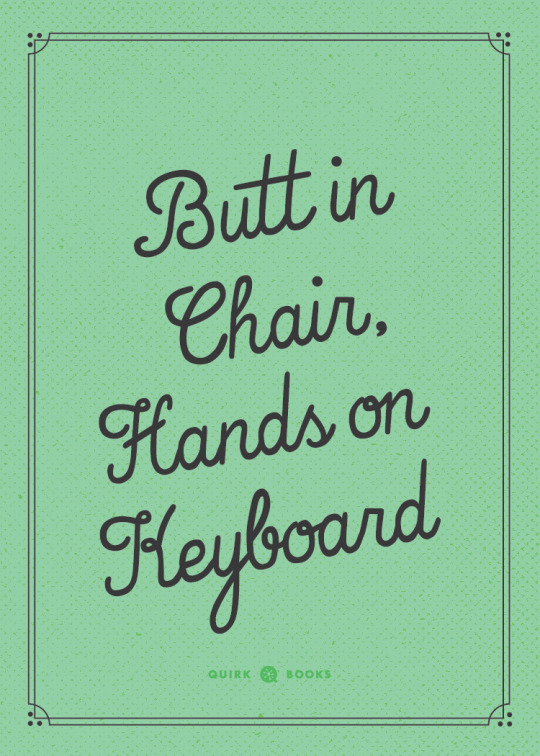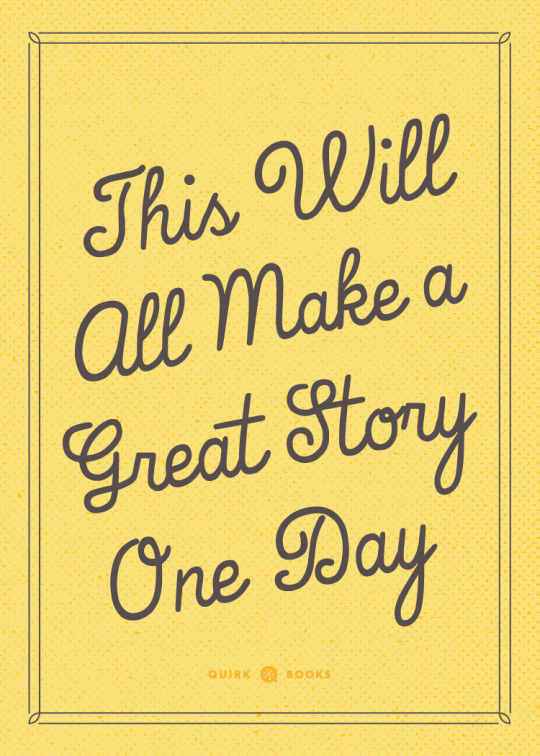Text
Description: Writing Exercises
Anonymous asked: Hey, your blog is great! It’s been a while since I’ve really written anything. Do you know of any exercises, aside from jumping right in to write my next story, that I can do to practice and improve my prose?
Here are some exercises you can try: Writing Prompts One of the best things you can do to improve your writing is to write—a lot! If you need a little inspiration, try some writing prompts. Here are some great sources for prompts on tumblr: Writing Prompts, Writing Prompts That Don’t Suck, Prompts & Pointers, Photo Prompts, Daily Writing Prompts, and Write World Reality TV Crew This is good for character and setting development, but you can also use it to practice description. Pretend that there is a reality TV crew following your character around during a normal day before the story starts. You can describe everything the “camera” sees, or you can write what you think the narrator/host would say. You can do this even if it would be anachronistic—just pretend the TV crew got there by time travel. ;) Sightseeing Tour This exercise is good for setting development and world building, but again, it can also be handy for practicing description. Pretend that you’re giving a tour of your setting and write what you would tell your tour group. You can do this for a small setting like a school or neighborhood, or you can do it for a larger setting like a town or kingdom. Again, don’t worry about anachronism… just invoke a time machine. ;) Travel Essay This is a variation of the sightseeing tour. Instead, pretend you’re a travel writer who has just visited your setting. How would you describe it to your readers? Real Estate Agent Another one that is great for both setting development and description. Here you’ll pretend you’re a real estate agent who is trying to sell a client on a building or even the town. What will you say about the location to make them want to sink their money into it? What ways can you find to highlight its good points while putting a positive spin on its bad points? Newspaper Article Here you’ll pretend you’re a local reporter covering an event that happens before or during your story. Like the previous exercises, this is great for practicing description, but it’s also handy for fleshing out event details. Character Interview Imagine that you’re doing an interview with one of your characters for a magazine, news show, or talk show. What compelling questions will you ask and how will they answer? This is a great character development exercise, but you can also challenge yourself to improve your writing-in-general. Spin-Off Story Write a short spin-off story featuring one of your other characters. It can take place anytime before, during, or after your main story. Challenge yourself to describe things in great detail. Use words you’ve never used before, try out unusual colors and verbs, and play with sentence structure. Description Journal Writing descriptively is a great way to work on your prose. Get yourself a spiral notebook or a composition notebook, and maybe some colorful ballpoint pens, and take it to various places like the mall, the library, your backyard, a coffee shop, etc. Describe where you are and what you’re seeing. You can focus on the setting in general, a particular part of the setting, or even a person or group of people. Dream Journal If you’re someone who has a lot of vivid dreams, dream journals are a fun way to practice writing and description. As soon as you wake-up, write down your dream in the most vivid detail that you can. Try to turn it into a story as much as possible. TV on Mute Grab a notebook or your laptop and find a TV show or movie that’s just starting. Put your TV on mute and just write about what you see. Don’t feel like you have to describe everything that happens. You’re not trying to come up with a laundry list of actions. Just sit back and observe and note the important details. You could say something like, “Three friends sit in comfy chairs at a trendy coffee shop. A tall woman with flowing blonde hair joins the group, evidently frustrated about something. The group urges her to share her story, some of them making jokes to lighten the mood.” Poem into a Story This is one of my favorite writing exercises. :) Choose a poem that inspires you and turn it into a short story. Go line by line and elaborate on what’s happening. Go into further detail about the setting and characters. Add action and details to flesh it all out. Song into a Story A variation on the above exercise. In this case, look for the story at the heart of the song and then write about it. Feel free to add your own characters and details if you want. Fan-Fiction is Fun! If you’ve never written fan-fiction before, now’s a great time to start. Choose an episode of your favorite show or a favorite movie, then give it an alternate ending. How would you have done things differently? Alternatively, expand upon a moment or event that was mentioned but occurred off-screen. I hope these exercises help with your writing! :)
2K notes
·
View notes
Text
How to Plot A Complex Novel in One Day (It WILL take all day)

Now first, I have to say, that the plot you’re able to come up with in one day is not going to be without its flaws, but coming up with it all at once, the entire story unfolds right in front of you and makes you want to keep going with it. So, where to begin?
What is your premise and basic plot? Pick your plot. I recommend just pulling one from this list. No plots are “original” so making yours interesting and complicated will easily distract from that fact, that and interesting characters. Characters will be something for you to work on another day, because this is plotting day. You’ll want the main plot to be fairly straight forward, because a confusing main plot will doom you if you want subplots.
Decide who the characters will be. They don’t have to have names at this point. You don’t even need to know who they are other than why they have to be in the story. The more characters there are the more complicated the plot will be. If you intend to have more than one subplot, then you’ll want more characters. Multiple interconnected subplots will give the illusion that the story is very complicated and will give the reader a lot of different things to look at at all times. It also gives you the chance to develop many side characters. The plot I worked out yesterday had 13 characters, all were necessary. Decide their “roles” don’t bother with much else. This seems shallow, but this is plot. Plot is shallow.
Now, decide what drives each character. Why specifically are they in this story? You can make this up. You don’t even know these characters yet. Just so long as everyone has their own motivations, you’re in the clear.
What aren’t these characters giving away right off the bat? Give them a secret! It doesn’t have to be something that they are actively lying about or trying to hide, just find something that perhaps ties them into the plot or subplot. This is a moment to dig into subplot. This does not need to be at all connected to their drive to be present in the story. Decide who is in love with who, what did this person do in the 70’s that’s coming back to bite them today, and what continues to haunt what-his-face to this very day. This is where you start to see the characters take shape. Don’t worry much about who they are or what they look like, just focus on what they’re doing to the story.
What is going to change these characters? Now this will take some thinking. Everyone wants at least a few of the characters to come out changed by the end of the story, so think, how will they be different as a result of the plot/subplot? It might not be plot that changes them, but if you have a lot of characters, a few changes that are worked into the bones of the plot might help you.
Now list out the major events of the novel with subplot in chronological order. This will be your timeline. Especially list the historical things that you want to exist in backstory. List everything you can think of. Think about where the story is going. At this point, you likely haven’t focused too much on the main plot, yeah, it’s there, but now really focus on the rising actions, how this main plot builds its conflict, then the climactic moment. Make sure you get all of that in there. This might take a few hours.
Decide where to start writing. This part will take a LOT of thinking. It’s hard! But now that you’ve got the timeline, pick an interesting point to begin at. Something with action. Something relevant. Preferably not at the beginning of your timeline - you want to have huge reveals later on where these important things that happened prior are exposed. This is the point where you think about what information should come out when. This will be a revision of your last list, except instead of being chronological, it exists to build tension.
Once you’ve gotten the second list done, you’ve got a plot. Does it need work? Probably. But with that said, at this point you probably have no idea who half your characters are. Save that for tomorrow, that too will be a lot of work.
46K notes
·
View notes
Link
Congratulations! Your epic space-opera novel is finished, and you’re preparing to fire off your query letters to agents. But even though you’ve read your manuscript a hundred times, you still may have missed some weaknesses. Here’s how to find them.
2K notes
·
View notes
Photo
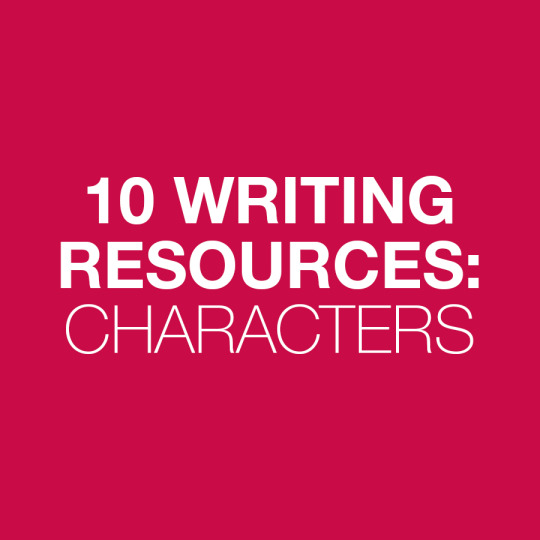
10 Writing Resources: Characters
From the basics to the very in-depth, these are some of the resources I go to when I’m developing new characters. Have a look at my favorites, and add your own!
1. 25 Things About Creating Characters
As a writer, creating characters is probably the most important thing you do. Get it wrong, and the story will be wrong no matter how well plotted.
2. Lessons From James Scott Bell: Characters That Jump Off The Page
Readers are engaged by characters who do not always act in a predictable way. Think of how to have your character make decisions or respond in ways the reader won’t see coming.
3. Crafting Memorable Characters
Successful main characters are the agents of their own destiny, they are someone we root for, and they grow or change during the course of the novel.
4. 6 Must-Know Tricks for Getting to Know Your Characters
Most of us don’t start writing until we’ve come up with a character we just adore. But how can we make sure this character will also be adored by our readers?
5. Creating Your Hero’s Fatal Flaw
The most intriguing conflicts are the ones that come from within people’s own personalities.
6. Five Unrealistic Character Traits
These characters have traits that are so unrealistic, the audience starts thinking about the author’s intention rather than the story at hand.
7. 100 Character Development Questions for Writers
Answer these in character, but only in a situation where your character would be 100% honest with themselves and with the person asking the question.
8. Writing Crutches: Gestures
What are gesture crutches, and why should we avoid them?
9. The Path to Deepening Your Protagonist
Protagonists don’t write themselves. No character does. So why leave trait-choice up to the character?
10. Nine Kick-Ass Excercises to Find Your Character’s Voice
Creating unique voices for each viewpoint character is essential in creating fiction readers want to read over and over.
What about you? What are your favorite blog posts about creating characters?
(cross posted over here)
25K notes
·
View notes
Photo
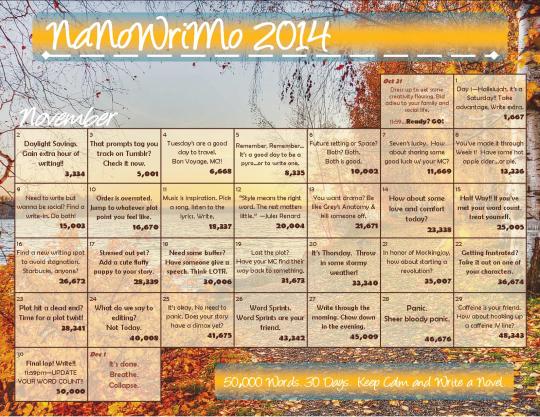
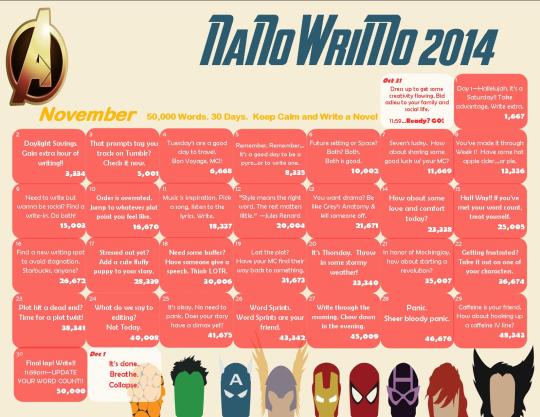
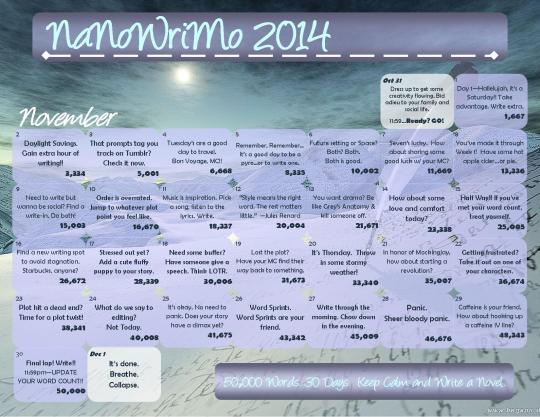
September marks the start of NaNo Prep. Since I haven’t seen any calendars for this year yet, I decided to make my own.
The full-size and download links are over on my deviantART page here.
If you want to know more about National Novel Writing Month, visit their site here or send me an ask.
(the background images aren’t mine)
2K notes
·
View notes
Text
Plot-A-Month-Wri-Mo or Something
As everyone enjoys the last weeks of summer and looks forward to the relief of fall (look, it’s fucking hot in Beijing), there is one thing we can all look forward to: NaNoWriMo is coming!
"Oh fuck you, Agent Black," you might say. "We just dealt with NaNoWriMo. Give us a break. November’s two and a half months away!"
Okay, okay, I totally get that, but that doesn’t change the fact that it’s coming (again), and a lot more people participate in November than they do any other time. Why am I mentioning this now? Because I’d like to run a month-long plotting activity to prepare for NaNo or anything else in September! I picked September because it gives you a month’s buffer between finishing your plot outline and launching into your actual story, giving you time to take a breather, scribble down more notes, or move your schedule around. So prepare for FuckYourWritingHabit’s September Plot-A-Month-Smorgasbord… okay, okay, I’m not good at names. Here’s what you need to know:
Each day I have a post, giving you something new to focus on crafting your plot outline and notes. This will be based loosely on Karen Wiesner’s First Draft in 30 Days scheduling, although out of respect for copyright and other reasons I will try to change it up (offer free material, differences in schedule/advice, etc).
You have to do absolutely nothing in order to participate. You can follow them daily, or save them up and do them on a weekend, or go back through the tags(#Plot A Month) to do them later. You don’t need to post anything, tag anything with the blog’s name, nothing. On the other hand, you totally can and that would be totally cool!
The end goal will be to have a useable plot outline, with research done and maps sketched out, to guide you through your future writing project. Chances are you won’t have it complete in a month (neither will I), but it will be there for future use.
Participation not necessary! This activity will be limited to one main post a day, with follow-up posts as necessary, but will not take up the whole blog. It’s only goal is to have a plot outline plan laid out by the end of the month, completely there for any future use or addition. Other resources and free material and advice will be liberally applied; the most important part? To have fun!
Tentative Schedule subject to change due to necessity):
August 25-31: Pre-month brainstorming activities!
Week 1: Characters, Setting, and Plot Ideas
Week 2: Research, Methods and Resources
Week 3: Plotting! Structure and Outline
Week 4: Catch-Up, Outline Finalizing, Last Minute Notes
358 notes
·
View notes
Photo
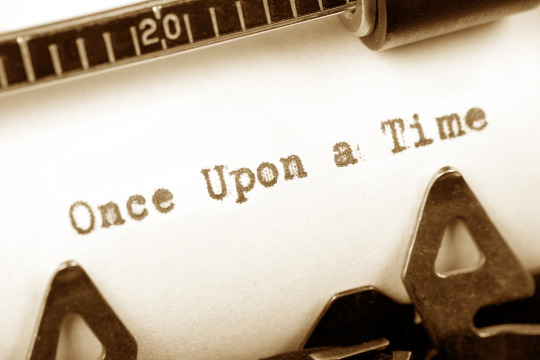
60 Awesome Search Engines for Serious Writers
Finding the information you need as a writer shouldn’t be a chore. Luckily, there are plenty of search engines out there that are designed to help you at any stage of the process, from coming up with great ideas to finding a publisher to get your work into print. Both writers still in college and those on their way to professional success will appreciate this list of useful search applications that are great from making writing a little easier and more efficient.
Professional
Find other writers, publishers and ways to market your work through these searchable databases and search engines.
Litscene: Use this search engine to search through thousands of writers and literary projects, and add your own as well.
Thinkers.net: Get a boost in your creativity with some assistance from this site.
PoeWar: Whether you need help with your career or your writing, this site is full of great searchable articles.
Publisher’s Catalogues: Try out this site to search through the catalogs and names of thousands of publishers.
Edit Red: Through this site you can showcase your own work and search through work by others, as well as find helpful FAQ’s on writing.
Writersdock: Search through this site for help with your writing, find jobs and join other writers in discussions.
PoetrySoup: If you want to find some inspirational poetry, this site is a great resource.
Booksie.com: Here, you can search through a wide range of self-published books.
One Stop Write Shop: Use this tool to search through the writings of hundreds of other amateur writers.
Writer’s Cafe: Check out this online writer’s forum to find and share creative works.
Literary Marketplace: Need to know something about the publishing industry? Use this search tool to find the information you need now.
Writing
These helpful tools will help you along in the writing process.
WriteSearch: This search engine focuses exclusively on sites devoted to reading and writing to deliver its results.
The Burry Man Writers Center: Find a wealth of writing resources on this searchable site.
Writing.com: This fully-featured site makes it possible to find information both fun and serious about the craft of writing.
Purdue OWL: Need a little instruction on your writing? This tool from Purdue University in Lafayette, IN can help.
Writing Forums: Search through these writing forums to find answers to your writing issues.
Research
Try out these tools to get your writing research done in a snap.
Google Scholar: With this specialized search engine from Google, you’ll only get reliable, academic results for your searches.
WorldCat: If you need a book from the library, try out this tool. It’ll search and find the closest location.
Scirus: Find great scientific articles and publications through this search engine.
OpenLibrary: If you don’t have time to run to a brick-and-mortar library, this online tool can still help you find books you can use.
Online Journals Search Engine: Try out this search engine to find free online journal articles.
All Academic: This search engine focuses on returning highly academic, reliable resources.
LOC Ask a Librarian: Search through the questions on this site to find helpful answers about the holdings at the Library of Congress.
Encylcopedia.com: This search engine can help you find basic encyclopedia articles.
Clusty: If you’re searching for a topic to write on, this search engine with clustered results can help get your creative juices flowing.
Intute: Here you’ll find a British search engine that delivers carefully chosen results from academia.
AllExperts: Have a question? Ask the experts on this site or search through the existing answers.
Reference
Need to look up a quote or a fact? These search tools make it simple.
Writer’s Web Search Engine: This search engine is a great place to find reference information on how to write well.
Bloomsbury Magazine Research Centre: You’ll find numerous resources on publications, authors and more through this search engine.
Merriam-Webster Dictionary and Thesaurus: Make sure you’re using words correctly and can come up with alternatives with the help of this tool.
References.net: Find all the reference material you could ever need through this search engine.
Quotes.net: If you need a quote, try searching for one by topic or by author on this site.
Literary Encyclopedia: Look up any famous book or author in this search tool.
Acronym Finder: Not sure what a particular acronym means? Look it up here.
Bartleby: Through Bartleby, you can find a wide range of quotes from famous thinkers, writers and celebrities.
Wikipedia.com: Just about anything and everything you could want to look up is found on this site.
Stanford Encyclopedia of Philosophy: Find all the great philosophers you could want to reference in this online tool.
Niche Writers
If you’re focusing on writing in a particular niche, these tools can be a big help.
PubGene: Those working in sci-fi or medical writing will appreciate this database of genes, biological terms and organisms.
GoPubMd: You’ll find all kinds of science and medical search results here.
Jayde: Looking for a business? Try out this search tool.
Zibb: No matter what kind of business you need to find out more about, this tool will find the information.
TechWeb: Do a little tech research using this news site and search engine.
Google Trends: Try out this tool to find out what people are talking about.
Godchecker: Doing a little work on ancient gods and goddesses? This tool can help you make sure you have your information straight.
Healia: Find a wide range of health topics and information by using this site.
Sci-Fi Search: Those working on sci-fi can search through relevant sites to make sure their ideas are original.
Books
Find your own work and inspirational tomes from others by using these search engines.
Literature Classics: This search tool makes it easy to find the free and famous books you want to look through.
InLibris: This search engine provides one of the largest directories of literary resources on the web.
SHARP Web: Using this tool, you can search through the information on the history of reading and publishing.
AllReaders: See what kind of reviews books you admire got with this search engine.
BookFinder: No matter what book you’re looking for you’re bound to find it here.
ReadPrint: Search through this site for access to thousands of free books.
Google Book Search: Search through the content of thousands upon thousands of books here, some of which is free to use.
Indie Store Finder: If you want to support the little guy, this tool makes it simple to find an independent bookseller in your neck of the woods.
Blogging
For web writing, these tools can be a big help.
Technorati: This site makes it possible to search through millions of blogs for both larger topics and individual posts.
Google Blog Search: Using this specialized Google search engine, you can search through the content of blogs all over the web.
Domain Search: Looking for a place to start your own blog? This search tool will let you know what’s out there.
OpinMind: Try out this blog search tool to find opinion focused blogs.
IceRocket: Here you’ll find a real-time blog search engine so you’ll get the latest news and posts out there.
PubSub: This search tool scours sites like Twitter and Friendfeed to find the topics people are talking about most every day.
30K notes
·
View notes
Photo

Jobs for Writers on pw.org
PW has a good job listing page just for writers. It’s interesting to browse through whether you’re actively looking for a job, or just want to see what sorts of jobs writers can have!
We also a post did a post a while ago where former English majors wrote in and told us what there jobs are now. You can read that here or on our Writing Advice page under “Education and Careers”.
533 notes
·
View notes
Photo
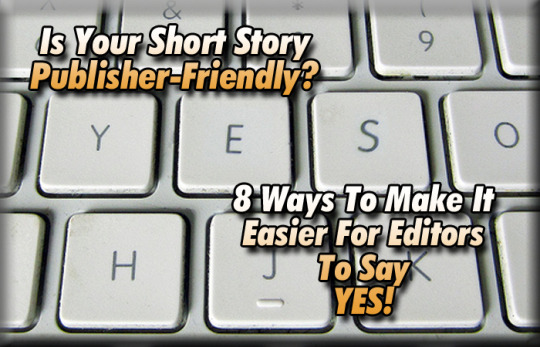
Is Your Short Story Publisher-Friendly? 8 Ways To Make It Easier For Editors To Say YES!
These days, it seems everyone—from professional writers to that guy in the coffee shop—is submitting short stories to literary journals. How do you give your short story every possible advantage so that it grabs an editor’s attention? First and foremost, your story should be page-turning terrific. But just as important: Does your short story make it easy for an editor to say, Yes, let’s publish that?
Here are some tips that will make it easier for an editor to give his or her stamp of approval.
1K notes
·
View notes
Text
Everything We Know About...Editing!
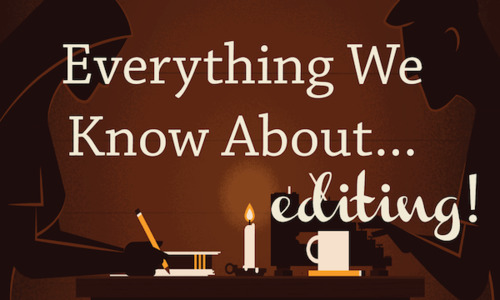
Are you tackling a writing project that isn’t a brand-spanking new novel during Camp NaNoWriMo? Good news! We’re compiling lists of everything we know about nonfiction, editing, and scripts. We revisit editing while it’s fresh in our minds from the “Now What?” Months below:
You get to the part of the novel where you think to yourself, “what now? How can I make it even better?” Well, that’s a sign for the best part to happen—the editing and revision process! Here are resources that can help you edit those inconsistent story lines and cut out those awkward scenes.
The Joys of Editing
Why Editing Matters… Even If You Never Share Your Novel
Time to Revise, But How Will I Know If I’m Making It Better, Not Worse?
On Rewriting & Growing Up
Revision & Slipping Back Into Your World
Deductive Editing: Revising Like a Master Detective
The Steps to Editing and Revision
A 7-Step Guide to Big Picture Revision (With Bonus Checklists!)
Revising Your Novel: The Good, the Bad, and the Ugly
The Big Bad Guide to Novel Revision
Beginning the Awesome Journey of Revision
Four Types of Book Editing
On Building Better Stories and Perseverance
Reveling with Your Inner Editor on the Revision Playground
In Your Words: Revision Advice from Young Writers
Why You Should Throw a Wrench In Your Editing Routine
Keep These In Mind When You Edit
The 6 Commandments of Starting the Editing Process
Tips from Revisionland
Be Kind to Yourself While You Edit
3 Ways to Let Your Writing Fly
What Should You Keep In Mind Before You Begin The Revision Process?
What to Keep When Editing Requires a Reset
Revision and Reading Aloud
As long as you have these resources, you’re well on your way to building an awesome book.
— Wendy
4K notes
·
View notes
Photo
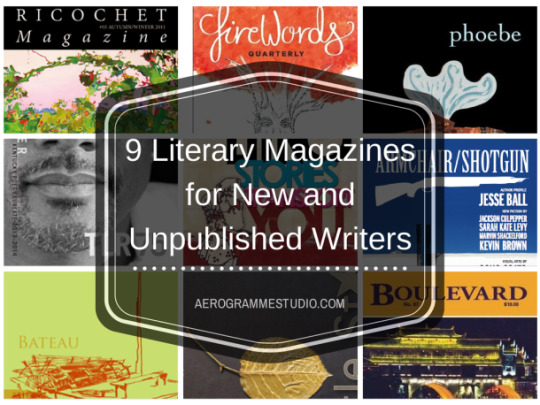
Nine Literary Magazines for New and Unpublished Writers
"Seeing your work in print for the first time is a unique thrill. But it can feel like a daunting task to submit your writing to a magazine or journal when you nobody other than friends and family has ever read it. To make the process somewhat less scary, here are 9 literary magazines that welcome submissions from new and never before published writers."
Read on.
Let’s stay connected.
3K notes
·
View notes
Photo
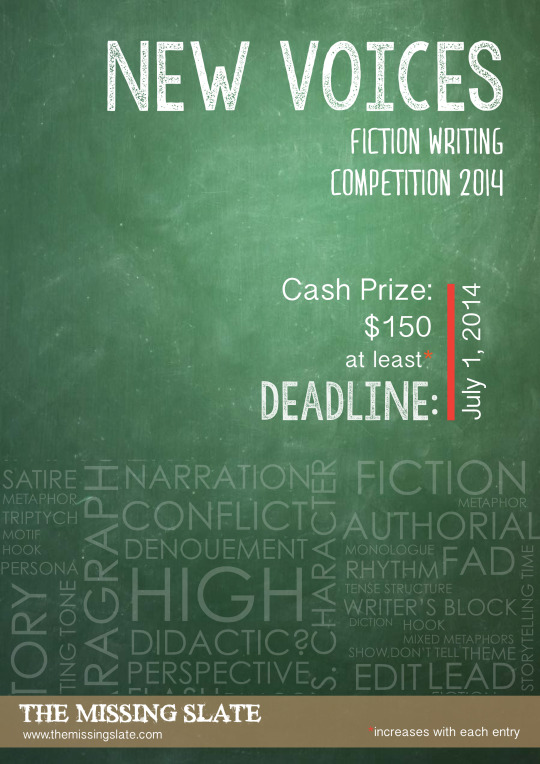
Deadline’s July 1, 2014 folks!
We’re starting with a paid fiction contest and hope to expand into poetry and short films. Any money we earn through the $10 submissions fee feeds right back into the prize. How many other contests do you know that split their earnings with the winner (okay, that’s a totally rhetorical question - please don’t send us answers to that)? PLUS the runners up get our merchandise packs. Submit here. :)
946 notes
·
View notes
Link
Oftentimes, I’ve seen agents talk about receiving queries for manuscripts pitched with three or more genres, which is a problem because it shows that the writer isn’t really sure what the genre is.
Determining your genre can, at times, be tricky, especially if your WIP has crossover elements (that is, elements that would appeal to other genres or categories). But long before you begin querying, it’s very important that you have a solid grasp on what your WIP’s genre and category are.
That being said, here are some steps to take when determining your manuscript’s genre and category.
Understand the difference between genre and category. Genre and category are not words that can be used interchangeably—they refer to two very different categorical labels. A book’s genre refers to the type of subject matter, that is, Fantasy, Contemporary, Adventure, Thriller, Horror, Sci-Fi, etc. Within a genre there are sub genres—Paranormal Fantasy, Urban Fantasy, Space Opera, Dystopia, Steampunk, etc. The category, on the other hand, refers to the age group, such as Picture Book, Middle Grade, Young Adult, New Adult and Adult. Within each category is a wide range of genre possibilities—Middle Grade Adventure, Young Adult Sci-Fi, New Adult Paranormal, Adult Thriller, etc. For your WIP’s purposes, you’ll want to know the category and genre (or subgenre, if applicable). One of each. There’s no such thing as a Middle Grade Young Adult Adventure Contemporary Romance Fantasy. Got it? Ok. For a slightly more detailed look at category vs. genre, take a look at this post.
Narrow down to whatever genres you think your WIP might be. If you’re going through this process, it’s because you’re not entirely sure what genre or category fits your book best. That’s ok, like I said, it can be tricky sometimes. Write down whatever genres and/or categories you think may fit your book, then move on to the next step.
Get to know those genres/research. This is the step that will take the longest. The only way to really determine what genre best fits your manuscript is to get to know those genres. Read books in the genres you’re considering, get to know the tropes that exist within the genres and do some research online. Read, research, repeat until you’re comfortable with the genres.
Ask yourself, “Which genre is closest to my manuscript?” Now this, to me, is the trickiest step. The thing is, there’s a lot of variety within every genre. For example, the Twilight series is extraordinarily different from��The Coldest Girl in Coldtown, even though both are YA Paranormal dealing with vampires—and both are markedly different from Ink, which is still Paranormal but doesn’t have any vampires at all. Matched is not the same as The Hunger Games even though both are YA Dystopias and Across the Universe is very different from The 5th Wave even though both are YA Sci-Fi. The key is not to look at every element your WIP has. Just because there’s romance doesn’t mean you’ve written a Romance novel, and just because you’ve written a futuristic Sci-Fi novel doesn’t mean you’ve written a Dystopia. What you want to focus on is what the main elements of your WIP are and decide what genre best embodies those elements. The Shatter Me series, for example, has many paranormal elements, but the prevailing main element is fighting the oppressive Reestablishment, which is a dystopian-type government in a very dystopian setting, and thus is mainly categorized as a Dystopian novel. The Mortal Instruments series has vampires, werewolves, fairies, etc. but is categorized as Urban Fantasy because of it’s very urban NYC-setting. Across the Universe has a heavy mystery element, but is categorized as Sci-Fi because the main elements involve a spaceship and technological advances like long-term space travel and cryogenics.
If your WIP has crossover appeal, that’s definitely not a bad thing, but it’s not an excuse to slap three or four genres on your manuscript, either. Choose the category and genre that fits your manuscript best and let your book (and the summary of your book) reveal the rest. Have you had difficulty determining a category or genre for your manuscript or a book you’ve read? How did you figure it out?
745 notes
·
View notes
Link
Any advice for writing Prose Poems? — superwholockshufflepuff
805 notes
·
View notes
Photo
We talked about this earlier this week.
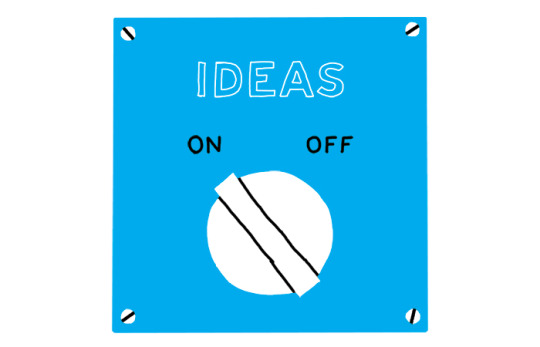
9 Ways to Generate Your Best Ideas
Idea generation is often seen as the magic side of creativity, and although I love the magic of it, I also feel like I have learned there is a practical side to it as well.
The great idea spirit seems as unpredictable as the weather. Don’t get me wrong, I agree that idea generation has a mystical side, I just think we have more power to be the catalyst of this spirit than many creatives believe.
Here are 9 ways to flip your own idea generation switch:
1. Think Hard & Then Let Go This idea comes from Jason Lehrer in his talk for 99u.com. Basically proof that the epiphany moment actually comes from a state in your mind when you are unfocused!
This is so true because often I will get so worked up trying to come up with an idea, let go, leave the ‘drawing board’ and take a shower or go on a walk and BAM! The idea pops into my head! 2. Brainstorm Ideas You don’t Intend to Use This is such an important practice and it takes the relaxed approach from number 1 on this list. When you brainstorm ideas that you don’t intend to use, you are free to fail, the pressure is off. This is where the good ideas are often born. 3. Sketchbook / Notepad Figure out a system that works for you. If you are like me you grew up with a ton of sketchbooks that you started strong with, but only filled in the first couple pages. Start small if it’s a struggle. The true point of this needs to be something you can always have on you to catch those breakthroughs when they happen. I consistently use my iphone to note ideas. 4. Get a Brainstorm Partner My wife is my brainstorm partner (she doesn’t really have a choice). I run all of my ideas by her, and she is so honest that it used to actually scare me, BUT this is what you are looking for in a brainstorm partner. You need someone who can quickly identify when ideas have no merit at all, and to help you discuss and develop the good ones before you actually get started. You especially need this if you do your primary mental processing externally. 5. Cling to the Constraints Idea generation can be daunting when the paper is completely blank. A good practice to is to fill that blank sheet with what you do know. If this is for a specific purpose, list the requirements. If this is for yourself, list what you want to get out of it. If this is for a specific topic, list what you already know about it, list what other people have told you, research and list what you can find. Ideas can be so elusive and cloudy, constraints and requirements give us something to hold onto in this uncertain and mystical area. This is a great talk from Katie Hawkins-Gaar on the importance of limitations or constraint.
6. Start with First Idea, Then Go Back to the Drawing Board Sometimes your best ideas come in the middle of the execution of other ideas. So if you are having a hard time coming up with more than one idea, and you don’t feel good about that idea, just get started anyway. Sometimes the project becomes more clear when you are actually working on it. While you execute that first idea, you may start to understand what’s not working with the idea, and this gives you a good springboard for brainstorming new ideas.
7. Loosen Your Brain with Free Association Just start writing or talking. This practice loosens my mind. I find it really easy to talk nonsense, if you know me very well at all you probably already know this. Often though in this silliness I find a creative groove. Free association is a Freudian psychological practice where the patient just speaks what comes to mind. Personally I like to get into this pattern and then start the ideation process.
8. Observe the Pattern Look back, when do you create your best ideas? Sometimes it’s hard to see how it happened, but if you look at enough of these moments a pattern should emerge. For me it has often been a certain type of music, and depending on the type of idea I am looking for, I will put on a specific type of music.
9. Start the Day Over with a Nap Michael Hyatt, a well known leadership blogger, is a big supporter of daily naps. He even wrote a blog post about it. I can’t say I support daily naps for everyone, I can’t practice it daily, but I do love Winston Churchill’s ideas on napping. He believed it was like starting your day twice. I love this because it’s sort of a restart button on your day. If you have the opportunity and your brain goes into gridlock and you can’t think of any ideas, take a short nap. When you wake up your mind will definitely be in a different place because you literally can’t sleep without your mind changing states.
Learning how to come up with ideas consistently will make or break your creative path, so it’s important to find what works for you.
How did you come up with your best idea?
5K notes
·
View notes






